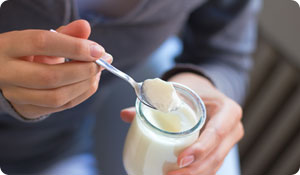
Want to lower your blood pressure? Adding yogurt to your meals may help, according to one study. Long-term yogurt eaters have lower systolic blood pressure and decreased risk of developing hypertension when compared to individuals who don't eat yogurt, according to a study reported in Medical News Today.
The research followed more than 2,000 individuals over the course of 15 years. The volunteers, who did not start out the study with high blood pressure, filled out questionnaires on three separate occasions to report their yogurt intake. The result? Nearly one third of the study participants were less likely to develop hypertension when at least 2 percent of their daily calorie intake came from yogurt.
The jury's still out on whether it makes sense from the standpoint of heart health to
bump up your yogurt consumption. Stephen Green, MD, associate chairman of the department of cardiology at NorthShore/LIJ Health Systems on Long Island, isn't totally convinced.
"The yogurt eaters in the study did better in terms of blood pressure than the non-yogurt eaters, but that doesn't mean yogurt eaters have lower blood pressure," he says. "The people in this study were just asked whether they ate yogurt. Their lower blood pressure could have been due to something else, such as the fact that they exercised or generally ate healthfully, he adds.
Regardless of whether yogurt actually helps lower blood pressure, it is a worthwhile addition to the diet, provided it is lowfat, says Georgia Giannopoulos, RD, CDN, CNSC, of NewYork-Presbyterian Hospital/Weill-Cornell Medical Center in New York City. "Yogurt has a lot of healthful properties, and it is good for the digestive tract," she
says.
One more health benefit? Yogurt is rich in calcium and can be a good source of vitamin D, although Giannopoulos advises checking the nutrition label since some yogurts contain more vitamin D than others. And if you are concerned about blood pressure, it's important to follow a low-sodium diet, she says. "Eating a lot of sodium can increase the
amount of fluid your body holds onto," Giannopoulos explains. "This can make it more difficult for the heart to do its job."
Keep daily sodium intake to less than 2,300 mg per day, Giannopoulos says, and further reduce it to 1,500 mg if you have hypertension, diabetes, chronic kidney disease, are African American, and/or are 51 or older.
As for the study linking yogurt consumption and blood pressure, Green notes, "I think this abstract is provocative but it is not enough for us to say we should all be eating
more yogurt."
Sources:
"Eating yogurt may protect against high blood pressure." 21 September 2012. Medical News Today.
http://www.medicalnewstoday.com/articles/250513.php





